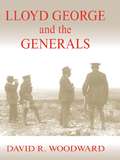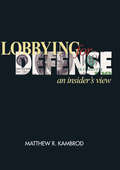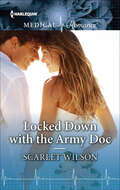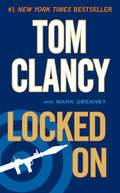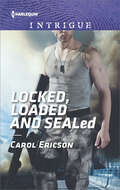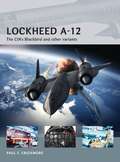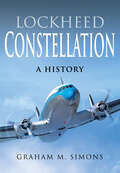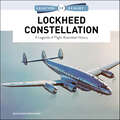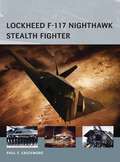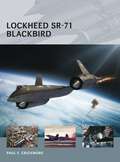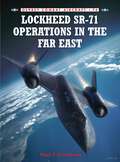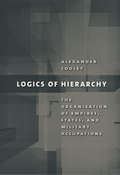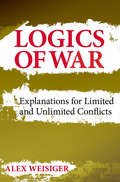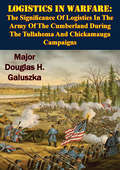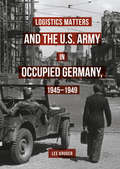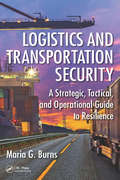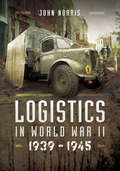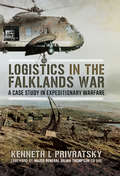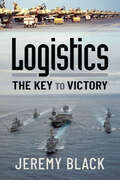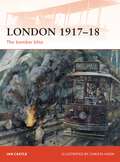- Table View
- List View
Lloyd George and the Generals (Military History and Policy)
by David R. WoodwardThe frustrating stalemate on the western front with its unprecedented casualties provoked a furious debate in London between the civil and military authorities over the best way to defeat Germany. The passions aroused continued to the present day. The mercurial and dynamic David Lloyd George stood at the centre of this controversy throughout the war. His intervention in military questions and determination to redirect strategy put him at odds with the leading soldiers and admirals of his day.Professor Woodward, a student of the Great War for some four decades, explores the at times Byzantine atmosphere at Whitehall by exhaustive archival research in official and private papers. The focus is on Lloyd George and his adversaries such as Lord Kitchener, General Sir William Robertson, and Field Marshall Sir Douglas Haig. The result is a fresh, compelling and detailed account of the interaction between civil and military authorities in total war.
Lobbying For Defense
by Matthew R. KambrodThis one-of-a-kind user's guide to successful lobbying for defense appropriation draws on Matthew R. Kambrod's forty-plus years of experience both in the Pentagon as a military officer and on Capitol Hill as a lobbyist. The book presents step-by-step instructions for the lobbyist along with detailed information that only someone with the author's background could provide. He understands how the system works and shows how, when lobbying is conducted within the boundaries of propriety, the process can efficiently benefit lawmakers and defense officials as well as industry.A former Deputy for Aviation to the Assistant Secretary of the Army for Research, Development, and Acquisition and a current lobbyist for the defense industry, Colonel Kambrod leads the reader through the annual lobbying process, explaining how the armed services establish their requirements for defense programs and how the annual budget is formulated. He also addresses the all-important distinction between "funded" and "unfunded" requirements; defines the roles played by the military, industry, and Congress; and lists the steps to be taken to develop arguments in the pursuit of congressional funding. Topics of general interest, such as campaign contributions, abuse of power, and possible lobbying reforms, are included along with a practical list of lessons learned and an appendix filled with samples of useful documents.In demystifying the process of lobbying for defense dollars, the author provides an essential tool for everyone interested in the subject both lobbyists and all those who must interact with them.
Lobos Rebeldes
by James QuinnEs conocido como el maestro. Espía, agente doble y asesino independiente, ha estado en la cima de su juego durante décadas. El Maestro ha trabajado para nazis, comunistas, agencias de inteligencia y terroristas por igual. Nadie conoce su verdadera identidad. Ahora, el asesino más reservado del mundo ha desaparecido, y varias redes de inteligencia quieren que sea capturado, interrogado y "censurado". Jack Grant, ahora un agente contractual para el Servicio Secreto francés, está asignado para rastrear al Maestro. Le pisa los talones a un mortal y hermoso cazarrecompensas de la CIA que es más que capaz de cazarlos a ambos. Pero el Maestro tiene una agenda propia, y está listo para comenzar una guerra que los envolverá a todos.
Local Dimensions of the Second World War in Southeastern Europe (Mass Violence in Modern History)
by Xavier Bougarel Hannes Grandits Marija VulesicaThis book deals with the Second World War in Southeastern Europe from the perspective of conditions on the ground during the conflict. The focus is on the reshaping of ethnic and religious groups in wartime, on the "top-down" and "bottom-up" dynamics of mass violence, and on the local dimensions of the Holocaust. The approach breaks with the national narratives and "top-down" political and military histories that continue to be the predominant paradigms for the Second World War in this part of Europe.
Locked Down with the Army Doc: Locked Down With The Army Doc / The Brooding Surgeon's Baby Bombshell (Mills And Boon Medical Ser.)
by Scarlet WilsonThere’s a crisis in paradise! But is her heart at risk…? When Dr. Amber Berkeley met ruggedly handsome Jack at a conference in Hawaii, she never imagined they’d end up locked down together in the middle of a hurricane! Army doc Jack’s take-charge attitude pushes straight-talking Amber’s buttons—until their sparks ignite into a fierce attraction! Amber has a “no doctors” dating rule for good reason, but amid disaster rules are meant to be broken…
Locked On (Jack Ryan Jr. #3)
by Tom Clancy Mark GreaneyThough his father had been reluctant to become a heroic field operative, Jack Ryan, Jr. wants nothing more...<P> Privately training with special forces, he's honing his combat skills to continue his work within the Campus, hunting down and eliminating terrorists wherever he can--even as Jack Ryan, Sr. campaigns to become President of the United States again. <P> But what neither father nor son knows is that the political and personal have just become equally dangerous. A devout enemy of Jack, Sr. launches a privately-funded vendetta to discredit him and connect him to a mysterious killing in his longtime ally John Clark's past. All they have to do is catch him. <P> With Clark on the run, it's up to Jack, Jr. to stop a growing threat emerging in the Middle East, where a corrupt Pakistani general has entered into a deadly pact with a fanatical terrorist to procure four nuclear warheads they can use to blackmail any world power into submission--or face annihilation.
Locked, Loaded and SEALed: Drury Locked, Loaded And Sealed Sheik's Rule (Red, White and Built #1)
by Carol EricsonA Navy SEAL must protect the mentee of a high-profile doctor from dangerous terrorists in this romantic suspense adventure.The SEAL’s secret assignment had been to protect a certain important doctor. But when the man is murdered, Austin Foley’s mission changes. The Navy sniper must now protect the doctor’s protégé, the irresistible Sophia Grant, at any cost. For Sophia has information that could endanger the entire country. There’s only one problem: Sophia has no idea what those secrets are. With lethal terrorists on their heels, Austin and Sophia must embark on a covert operation. But it will mean placing Sophia even more in harm’s way—a sacrifice not even the steel-hearted SEAL may be able to make. Praise for Locked, Loaded, and SEALed“A riveting thrill ride from start to finish.” —Caitlyn Lynch, author of the Rescue Rangers series
Lockheed A-12
by Adam Tooby Paul CrickmoreDuring the early years of the Cold War, the most effective way to gather strategic intelligence about the Soviet Union and its allies was manned overflight. Lockheed's U-2 was spectacularly successful in this role. Much to the concern of President Eisenhower, its shape meant that it could be tracked on Russian radars. Given the highly sensitive nature of such flights, the President insisted that every effort should be made to reduce to zero the U-2's radar cross section (RCS), thereby making the aircraft "invisible." When this was proven to be impossible, the stage was set for a U-2 replacement. Following a competition between Lockheed and Convair, the former was declared the winner and the result was the A-12. Designed to incorporate 'stealth' features before the term was even coined, the A-12 has to date proven to be the fastest, highest flying jet aircraft ever built, and is operated exclusively by the Central Intelligence Agency. This book will also cover a two-seat variation of the design built as an advanced interceptor - the YF-12. In addition, the D-21 drone programme, known as Tagboard will also be covered.
Lockheed Constellation: A History
by Graham M SimonsThis illustrated history &“recounts the unusual and sometimes dramatic development and operational career of one of the twentieth century&’s most iconic airliners&” (Aviation History Magazine). Clarence &“Kelly&” Johnson&’s design for the Lockheed Constellation, known affectionately as the Connie, produced one of the world&’s most iconic airliners. Lockheed had been working on the L-044 Excalibur, a four-engine, pressurized airliner, since 1937. In 1939, Trans World Airlines, at the instigation of major stockholder Howard Hughes, requested a forty-passenger transcontinental aircraft with a range of 3,500 miles, well beyond the capabilities of the Excalibur design. TWA&’s requirements led to the L-049 Constellation, designed by Lockheed engineers including Kelly Johnson and Hall Hibbard. Between 1943 and 1958, Lockheed built 856 Constellations in numerous models at its Burbank, California, factory—all with the same distinctive and immediately recognizable triple-tail design and dolphin-shaped fuselage. The Constellation was used as a civil airliner and as a military and civilian air transport, seeing service in the Berlin and the Biafran airlifts. Three of them served as the presidential aircraft for Dwight D. Eisenhower. After World War II, TWA&’s transatlantic service began on February 6, 1946 with a New York-Paris flight in a Constellation. Then, on June 17, 1947, Pan Am opened the first-ever scheduled round-the-world service with their L-749 Clipper America. With revealing insight into the Lockheed Constellation, the renowned aviation historian Graham M. Simons examines its design, development, and service, both military and civil. In doing so, he reveals the story of a design which, as the first pressurized airliner in widespread use, helped to usher in affordable and comfortable air travel around the world. &“Simons makes good use of black-and-white and color photographs of Constellations in various airline markings and includes colorful airline brochures and marketing posters featuring the aircraft.&” —Air Power History
Lockheed Constellation: A Legends of Flight Illustrated History
by Wolfgang BorgmannA concise illustrated history of the Lockheed Constellation, Super Constellation and Starliner The Lockheed Constellation is the definitive postwar prop airliner. The type was developed during the Second World War by a talented and famous development team, which included Howard Hughes and Kelly Johnson. This book provides a colorful illustrated history of the type. Readers will enjoy several hundred vintage photographs featuring aircraft and airlines from all over the world. There is ample coverage for all three major commercial variants of the aircraft: the Constellation, the Super Constellation, and the Starliner. Wartime service by military versions is also described. She was affectionally named "Mona Lisa of the Skies" by her fans, and the Constellation's graceful lines were the epitome of elegance and beauty in the "golden age" of air transport. One chapter is dedicated to the special features and extra comforts provided by luxury carriers. Freighter models and conversions are also detailed in their own chapter.
Lockheed F-104 Starfighter: Interceptor, Strike, Reconnaissance Fighter (Profiles of Flight)
by Martin W. Bowman Dave WindleThe Starfighter was once described as a delight to fly, but one mistake and it will kill you. It is one of the worlds fastest fighters with a top speed of Mach 2.2 and a service ceiling of 58,000 feet. First delivered to the USAF in 1958 it was also sold to the German, Greek, Italian, Turkish and Italian Air Forces. It could carry a variety of air to air, and air to surface missiles and was powered by a single General Electric J79 turbojet that developed 17,900lbs of thrust with afterburner. The Italian Air Force continued to fly it into the 21st Century.This book contains the world famous color profiles created by Dave Windle of the type in different operational modes, configurations and color schemes. Martin Bowman has written detailed descriptions and photographs to create the perfect enthusiasts' reference.
Lockheed F-117 Nighthawk Stealth Fighter
by Adam Tooby Paul CrickmoreFrom its questionable debut over Panama, the shoot-down of a Nighthawk during Operation Allied Force over the former Yugoslavia, to the mind-boggling successes enjoyed by the type in the two Gulf Wars, this is the story of another 'Skunk Works' icon that took aircraft design and operational capabilities to previously unprecedented levels.Even from the earliest days of 'dog-fighting', when pilots attempted to attack their advisories with the sun on their backs, one adage has held true - "you can't destroy what you can't see". Even with the advent of radar the precept remains valid, however, the "But how?" conundrum had perplexed aircraft design engineers since the Second World War. Although designers and engineers had a number of tools available to help reduce an aircraft's Radar Cross Section (RCS), ranging from its physical shape, to the use of Radar Absorbent Materials (RAM) - as seen in the A-12/SR-71, any reductions achieved by the mid 1970's were at best modest and certainly not enough to gain "an explicit operational advantage". The magnitude of the problem faced is demonstrated by the radar equation "detection range is proportional to the fourth root of the radar cross-section." That is to say, in order to reduce the detection range by a factor of 10 in number, it is necessary to reduce the target aircraft's RCS by a factor of 10,000 or 40 dBs!However utilising the unrivalled talent available within the legendary Lockheed 'Skunk Works' and what was at the time, ground-breaking computer technology, project 'Have Blue' validated the concept of stealth and evolved into the highly classified 'Senior Trend' (F-117A) programme.
Lockheed SR-71 Blackbird
by Paul CrickmoreThe SR-71 has come to represent the very pinnacle of Cold War aircraft design - indeed, it has become an icon. Together with its predecessor, the A-12, the Blackbird was a giant leap into the technical unknown as the design employed many forms of new technology made necessary by the excesses of speed, altitude and temperature to which the aircraft was subjected. Throughout its 34-year Air Force career, the SR-71 proved itself to be the world's fastest and highest flying operational manned aircraft. It set a number of world records for altitude and speed, including an absolute altitude record of 85,069ft on 28 July 1974, and an absolute speed record of 2,193.2mph the same day. This truly was a unique and ground-breaking aircraft, whose fascinating design history is explored here in full and illuminated with photographs and detailed technical illustrations.
Lockheed SR-71 Operations in the Far East
by Chris Davey Paul CrickmoreEven before the first operational flight of the legendary Lockheed U-2 spy plane, aircraft design genius Kelly Johnson began work with his team at the company's "Skunk Works" plant on the type's replacement. The result was the SR-71. First deployed on March 9, 1968, this tri-sonic 'hotrod' flew its first operational sortie over North Vietnam just 12 days later. On that debut mission, the Blackbird overflew surface-to-air missile sites with complete impunity, collecting the detailed intelligence that led directly to the end of the siege of Khe Sanh in the process. Thereafter, the SR-71 roamed freely over areas previously denied to the vulnerable U-2, capturing photographic, radar and electronic intelligence. This book examines the immense impact this revolutionary aircraft had, not only on North Vietnam (Vietnam War, 1955-1975) but during the Cold War (1946-1991) as a whole, gathering information about the Soviet nuclear submarine fleet based in Vladivostok as well as the port's defenses, monitoring the actions of North Korea and flying four 11-hour, non-stop sorties into the Persian Gulf during the Iran-Iraq War in the late 1980s.
Logics Of Hierarchy: The Organization of Empires, States, and Military Occupations
by Alexander CooleyPolitical science has had trouble generating models that unify the study of the formation and consolidation of various types of states and empires. The business-administration literature, however, has long experience in observing organizations. According to a dominant model in this field, business firms generally take one of two forms: unitary (U) or multidivisional (M). The U-form organizes its various elements along the lines of administrative functions, whereas the M-form governs its periphery according to geography and territory. In Logics of Hierarchy, Alexander Cooley applies this model to political hierarchies across different cultures, geographical settings, and historical eras to explain a variety of seemingly disparate processes: state formation, imperial governance, and territorial occupation. Cooley illustrates the power of this formal distinction with detailed accounts of the experiences of Central Asian republics in the Soviet and post-Soviet eras, and compares them to developments in the former Yugoslavia, the governance of modern European empires, Korea during and after Japanese occupation, and the recent U. S. occupation of Iraq. In applying this model, Logics of Hierarchy reveals the varying organizational ability of powerful states to promote institutional transformation in their political peripheries and the consequences of these formations in determining pathways of postimperial extrication and state-building. Its focus on the common organizational problems of hierarchical polities challenges much of the received wisdom about imperialism and postimperialism.
Logics of War: Explanations for Limited and Unlimited Conflicts
by Alex WeisigerMost wars between countries end quickly and at relatively low cost. The few in which high-intensity fighting continues for years bring about a disproportionate amount of death and suffering. What separates these few unusually long and intense wars from the many conflicts that are far less destructive? In Logics of War, Alex Weisiger tests three explanations for a nation's decision to go to war and continue fighting regardless of the costs. He combines sharp statistical analysis of interstate wars over the past two centuries with nine narrative case studies. He examines both well-known conflicts like World War II and the Persian Gulf War, as well as unfamiliar ones such as the 1864-1870 Paraguayan War (or the War of the Triple Alliance), which proportionally caused more deaths than any other war in modern history. When leaders go to war expecting easy victory, events usually correct their misperceptions quickly and with fairly low casualties, thereby setting the stage for a negotiated agreement. A second explanation involves motives born of domestic politics; as war becomes more intense, however, leaders are increasingly constrained in their ability to continue the fighting. Particularly destructive wars instead arise from mistrust of an opponent's intentions. Countries that launch preventive wars to forestall expected decline tend to have particularly ambitious war aims that they hold to even when fighting goes poorly. Moreover, in some cases, their opponents interpret the preventive attack as evidence of a dispositional commitment to aggression, resulting in the rejection of any form of negotiation and a demand for unconditional surrender. Weisiger's treatment of a topic of central concern to scholars of major wars will also be read with great interest by military historians, political psychologists, and sociologists.
Logistics In Warfare: The Significance Of Logistics In The Army Of The Cumberland During The Tullahoma And Chickamauga Campaigns
by Major Douglas H. GaluszkaThis is a study of the logistical system that supported the Union armies in the Civil War, focusing on the Army of the Cumberland under the command of Major General William S. Rosecrans in 1863. It begins with a description of the logistical bureaus in the War Department in Washington, D.C. and the challenges they had in developing the national logistical support structure in the first years of the war. Next, the support structure in the Department of the Cumberland is described, to include the challenges in maintaining the rail link from Nashville, Tennessee, back to Louisville, Kentucky. Finally, the performances of the commanders and logisticians in the field during the Tullahoma and Chickamauga Campaigns are explored, with an emphasis on the problems with transportation.This study concludes that the logisticians overcame enormous problems to create a logistical system that allowed the commanders to win the war. In the Army of the Cumberland, the support was exceptional when compared to the challenges that were faced. Logistics became a limiting factor because of the senior leadership's poor planning, disregarded orders, and unrealistic expectations which doomed both the Tullahoma and Chickamauga Campaigns from achieving decisive results even before they had begun.This study attempts to put the rarely explored, but extremely significant, field of logistics in its proper place of importance in the study of military history. Logistics is inextricably tied with strategy and tactics; without logistics, victory is not possible.
Logistics Matters and the U.S. Army in Occupied Germany, 1945-1949
by Lee KrugerThis book examines the U. S. Army's presence in Germany after the Nazi regime's capitulation in May 1945. This presence required the pursuit of two stated missions: to secure German borders, and to establish an occupation government within the assigned U. S. zone and sector of Berlin. Both missions required logistics support, a critical aspect often understated in existing scholarship. The security mission, covered by the combat troops, declined between 1945 and 1948, but grew again with the Berlin Blockade/Airlift in 1948, and then again with the Korean crisis in 1950. The logistics mission grew exponentially to support this security mission, as the U. S. Army was the only U. S. Government agency possessing the ability and resources to initially support the occupation mission in Germany. The build-up of 'Little Americas' during the occupation years stood forward-deployed U. S. military forces in Europe in good stead over the ensuing decades.
Logistics and Politics in the Middle East
by Kristian Coates UlrichsenAn examination of how the logistical demands of the British military campaigns in Palestine and Mesopotamia led to a more intrusive and authoritarian form of imperial control in 1917-18. This early example of Western military intervention in the Middle East provoked a localized backlash in 1919-20 whose effects continue to be felt today.
Logistics and Transportation Security: A Strategic, Tactical, and Operational Guide to Resilience
by Maria G. Burns"Professor Burns has captured the essence of transportation security, one of today's most pressing concerns. As the rate of globalization and world trade increases, security and supply chain resilience are at the core of one‘s global transportation network. This is a timely and well written contribution to the industry." John A. Moseley, Senior Dir
Logistics in World War II, 1939–1943: 1939-1945
by John NorrisJohn Norris shows how logistics, though less glamorous than details of the fighting itself, played a decisive role in the outcome of every campaign and battle of World War Two. The author marshals some astounding facts and figures to convey the sheer scale of the task all belligerents faced to equip vast forces and supply them in the field. He also draws on firsthand accounts to illustrate what this meant for the men and women in the logistics chain and those depending on it at the sharp end. Many of the vehicles, from supply trucks to pack mules, and other relevant hardware are discussed and illustrated with numerous photographs. This first volume of two looks at the early years of the war, so we see, for example, how Hitler's panzer divisions were kept rolling in the Blitzkrieg (a German division in 1940 still had around 5000 horses, requiring hundreds of tons of fodder) and the British army's disastrous loss of equipment at Dunkirk. This is a fascinating and valuable study of a neglected aspect of World War Two.
Logistics in the Falklands War: A Case Study in Expeditionary Warfare
by Kenneth L. PrivratskyA military logistics expert analyzes the detailed coordination employed by the British during the Falklands War in 1982. While many books have been written on the Falklands War, this is the first to focus on the vital aspect of logistics. The challenges were huge: the lack of preparation time, the urgency, the huge distances involved, and the need to requisition ships from trade to name but four. After a brief discussion of events leading to Argentina&’s invasion, the book details the rush to re-organize and deploy forces, dispatch a large task force, the innovative solutions needed to sustain the task force, the vital staging base at Ascension Island, the in-theatre resupply, the set-backs, and finally the restoring of order after victory. Had the logistics plan failed, victory would have been impossible and humiliation inevitable, with no food for the troops, no ammunition for the guns, no medical support for casualties, etc. The lessons learned have never been more important with increasing numbers of out-of-area operations required in remote trouble spots at short notice. The Falklands experience is crucial for the education of new generations of military planners and fascinating for military buffs, and this book fills an important gap.&“With inadequate training, little intelligence, no contingency plan, a politically driven rush and at 8,000 miles, it is not surprising that logistics during Op CORPORATE were confusing and challenging. It has taken a US Army general to explain why. We should all be grateful.&” —Michael Clapp, Commander Amphibious Task Force&“A timely book that explores the logistical challenges of projecting decisive combat power across transoceanic distances.&” —Marine Corps Gazette
Logistics: The Key to Victory
by Jeremy BlackThis wide-ranging military history examines the vital yet overlooked role of logistics through the global evolution of warfare.An army cannot operate without supplies, yet military researchers and historians often overlook the essential aspect of logistics. In this comprehensive study, Jeremy Black provides an informative yet concise world history of military logistics through the ages.With special focus on key conflicts, Black examines such factors as climate, geography, food supplies, welfare of troops, payment, transport, communications, terrain, and distance. He also considers related factors including government policy, stability, and financial conditions. He covers the sweep of history, from ancient and medieval times to modern eras of industrial warfare, highlighting technological advances from oil and steam to cyber warfare and smart weapons.
Lola Carlyle Reveals All
by Rachel GibsonLola Carlyle Reveals All is a brilliantly enjoyable rom-com from New York Times bestseller Rachel Gibson - perfect for fans of Jill Shalvis, Jo Watson and Christina Lauren.Gorgeous ex-underwear model Lola Carlyle is a survivor, but when humiliating photos of her appear on the Net, she decides enough is enough and flees to the Bahamas for some peace and quiet. Or so she thinks...Max Zamora may be a government agent with his cover blown, but when he commandeers Lola's yacht she sure as hell isn't going to give in without a fight. After her attempts to escape cast the pair adrift and into a series of near-death situations, Lola realises she's never been so scared in all her life. Her only hope of getting out alive rests with sexy, dangerous Max. But trapped on-board with Lola, his mind's soon on other things...With everything hotting up in more ways than one, is Lola Carlyle about to reveal all?
London 1917-18
by Christa Hook Ian CastleOsprey's Campaign title for the Gotha and the massive Staaken 'Giant' bomber raids against London during World War I (1914-1918). On a sunny May afternoon in 1917, the peace of an English seaside town was shattered when a flight of German Gotha bombers appeared without warning. Twenty-three Gothas had set out to attack London in this first bomber raid, but heavy cloud forced them to target Folkestone and the Shorncliffe army camp instead. It was the start of a new phase of the war aimed at destroying the morale of the British people. London's defences were quickly overhauled to face this new threat, providing the basis for Britain's defence during World War II.
